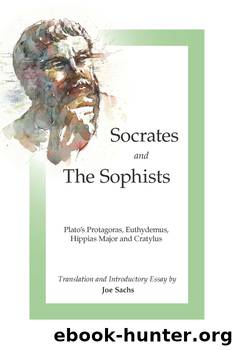Socrates and the Sophists by Plato

Author:Plato
Language: eng
Format: epub
Publisher: Hackett Publishing Company, Inc.
Published: 2012-01-15T00:00:00+00:00
_________________________________
11 The Athenian aristocracy commonly used the phrase kalos kai agathos for someone with the bearing and manners of a proper gentleman. Socrates, a bit further on, will contrast Axiochusâs son (Cleinias) with his lover Ctesippus in this respect.
12 Socrates almost always uses the dual number for the two brothers, instead of the plural. The translation uses the word âpairâ and singular pronouns and verbs to capture the odd overemphatic effect of this usage. In this speech, for instance, the pair of brothers is several times referred to as âit,â since a dual entity is neither a âtheyâ nor a âhe.â
13 This is referred to in Platoâs Apology (31D) and Phaedrus (242B-C) as âa sort of voiceâ that held him back from actions that would have been to his detriment.
14 Socrates uses the word hubristês. Hubris ranges in meaning from insolent disdain to violent cruelty. Its use here is clearly at the milder end of the range, but just as clearly clashes with the conventional phrase for gentlemanliness. Later in the dialogue, Ctesippus will display the kind of feisty rudeness another tradition might call chutzpah.
15 This is the phrase used for proper gentlemen, used above by Crito for Cleiniasâs looks and by Socrates for Ctesippusâs nature.
16 The Carians were the first mercenary soldiers, and Carian slaves were cheap, in plentiful supply, and regarded as expendable. The reference to Medea just below is to a trick she played on the daughters of Pelias, getting them to cut their father up and boil him as a way of restoring him to youth.
17 A satyr skinned by Apollo after challenging him to a musical competition, his piping against Apolloâs harping, and losing.
18 Literally âsuch a Cronos,â the god who once ruled the universe but was overthrown by Zeus and the rest of the new gods.
19 The sentence is construed with the ânotâ inserted by an earlier editor, and keeping the five words cut out by Burnet.
20 One reason why Socrates speaks of these men in the dual so often may be found this speech. When each of a pair of contradictory assumptions has consequences, the tag-team style of the men allows the two of them together to have it both ways. But the argument itself does not move anywhere, since no one takes responsibility for making a choice; the topic just spins in one place, as in the dance metaphor in 276D.
21 A shape-shifting sea god described in the Odyssey (IV, 384-424) who eventually gave truthful answers to Menelausâs questions, but only after heâd held him still until he stopped his shifting.
22 The art of dialectic is described by Socrates in the divided-line passage at the end of Bk. VI of Platoâs Republic as philosophic reasoning that can suspend and look behind its own assumptions, unlike mathematical reasoning that is always bound by hypotheses. The word dialektikê might also have been used by others for the sort of logic-chopping games played by debaters, which would account for the following qualification. This digression on
Download
This site does not store any files on its server. We only index and link to content provided by other sites. Please contact the content providers to delete copyright contents if any and email us, we'll remove relevant links or contents immediately.
american english file 1 student book 3rd edition by Unknown(613)
Phoenicians among Others: Why Migrants Mattered in the Ancient Mediterranean by Denise Demetriou(609)
Verus Israel: Study of the Relations Between Christians and Jews in the Roman Empire, AD 135-425 by Marcel Simon(595)
Caesar Rules: The Emperor in the Changing Roman World (c. 50 BC â AD 565) by Olivier Hekster(580)
Basic japanese A grammar and workbook by Unknown(579)
Europe, Strategy and Armed Forces by Sven Biscop Jo Coelmont(521)
Give Me Liberty, Seventh Edition by Foner Eric & DuVal Kathleen & McGirr Lisa(499)
Banned in the U.S.A. : A Reference Guide to Book Censorship in Schools and Public Libraries by Herbert N. Foerstel(492)
The Roman World 44 BC-AD 180 by Martin Goodman(478)
Reading Colonial Japan by Mason Michele;Lee Helen;(469)
DS001-THE MAN OF BRONZE by J.R.A(465)
Introducing Christian Ethics by Samuel Wells and Ben Quash with Rebekah Eklund(458)
The Dangerous Life and Ideas of Diogenes the Cynic by Jean-Manuel Roubineau(457)
Imperial Rome AD 193 - 284 by Ando Clifford(456)
The Oxford History of World War II by Richard Overy(454)
Catiline by Henrik Ibsen--Delphi Classics (Illustrated) by Henrik Ibsen(428)
Language Hacking Mandarin by Benny Lewis & Dr. Licheng Gu(412)
Literary Mathematics by Michael Gavin;(408)
Brand by Henrik Ibsen--Delphi Classics (Illustrated) by Henrik Ibsen(391)
